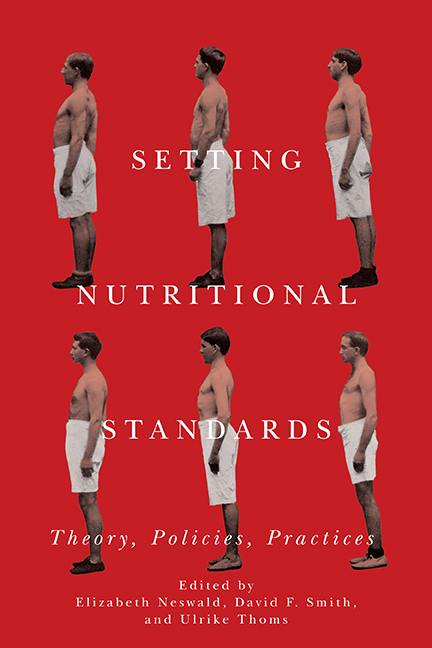Book contents
- Frontmatter
- Contents
- Acknowledgments
- Introduction
- 1 Nutritional Knowledge between the Lab and the Field: The Search for Dietary Norms in the Late Nineteenth and Early Twentieth Centuries
- 2 How Vegetarians, Naturopaths, Scientists, and Physicians Unmade the Protein Standard in Modern Germany
- 3 Of Carnivores and Conquerors: French Nutritional Debates in the Age of Empire, 1890–1914
- 4 Setting Standards: The Soldier's Food in Germany, 1850–1960
- 5 The Quest for a Nutritional El Dorado: Efforts to Demonstrate Dietary Impacts on Resistance to Infectious Disease in the 1920s and 1930s
- 6 “Not a Complete Food for Man”: The Controversy about White versus Wholemeal Bread in Interwar Britain
- 7 “Proscribing Deception”: The Gould Net Weight Amendment and the Origins of Mandatory Nutrition Labeling
- 8 When Is a Famine Not a Famine? Gauging Indian Hunger in Imperial and Cold War Contexts
- Selected Bibliography
- List of Contributors
- Index
2 - How Vegetarians, Naturopaths, Scientists, and Physicians Unmade the Protein Standard in Modern Germany
Published online by Cambridge University Press: 18 April 2018
- Frontmatter
- Contents
- Acknowledgments
- Introduction
- 1 Nutritional Knowledge between the Lab and the Field: The Search for Dietary Norms in the Late Nineteenth and Early Twentieth Centuries
- 2 How Vegetarians, Naturopaths, Scientists, and Physicians Unmade the Protein Standard in Modern Germany
- 3 Of Carnivores and Conquerors: French Nutritional Debates in the Age of Empire, 1890–1914
- 4 Setting Standards: The Soldier's Food in Germany, 1850–1960
- 5 The Quest for a Nutritional El Dorado: Efforts to Demonstrate Dietary Impacts on Resistance to Infectious Disease in the 1920s and 1930s
- 6 “Not a Complete Food for Man”: The Controversy about White versus Wholemeal Bread in Interwar Britain
- 7 “Proscribing Deception”: The Gould Net Weight Amendment and the Origins of Mandatory Nutrition Labeling
- 8 When Is a Famine Not a Famine? Gauging Indian Hunger in Imperial and Cold War Contexts
- Selected Bibliography
- List of Contributors
- Index
Summary
Introduction
How is biopolitical knowledge made? Encompassing everything from pro- and antinatalist tax policies to antismoking campaigns, biopolitics refers to a wide spectrum of scientifically informed practices that aim to optimize the human resources of modern nations. In recent years, historians have devoted significant effort to understanding the role of scientists, doctors, and social planners in creating and administering biopolitical regimes. In the German context, for instance, scholars have carefully unpacked how ambitious young “genetics doctors” in the 1930s worked in concert with the state to establish research centers and implement policies for assessing and improving the nation's racial fitness. Excellent as this scholarship has been, it has largely assumed something that the following essay questions: that the most important players in modern biopolitical dramas have been technocratic elites working through the state in a largely top-down manner. In this context, modern nutrition science offers many opportunities for expanding how we think about biopolitics. As a field seeking to understand and manage the physical fitness of vast human populations via diet, modern nutrition science is certainly an important example of modern biopolitics, yet one to which historians have devoted little attention. It is, moreover, a particularly instructive field because it has encompassed such a diversity of actors. As we might expect, experimentalists, clinicians, and policymakers played star roles in inventing and implementing nutrition science. More surprisingly, however, lay people with little to no scientific training also participated in this effort and, indeed, often pushed experts to change what they thought they knew about diet. As a field of biopolitical knowledge and practice, in other words, nutrition science has been made by a heterogenous group of players whose dynamics do not follow the top-down model. This essay develops that claim by focusing on a specific episode in the history of nutrition science, the unmaking of the protein standard in late nineteenth- and early twentieth-century Germany, yet also aspires to raise larger methodological questions about how scholars approach the history of biopolitics more generally.
- Type
- Chapter
- Information
- Setting Nutritional StandardsTheory, Policies, Practices, pp. 52 - 73Publisher: Boydell & BrewerPrint publication year: 2017

